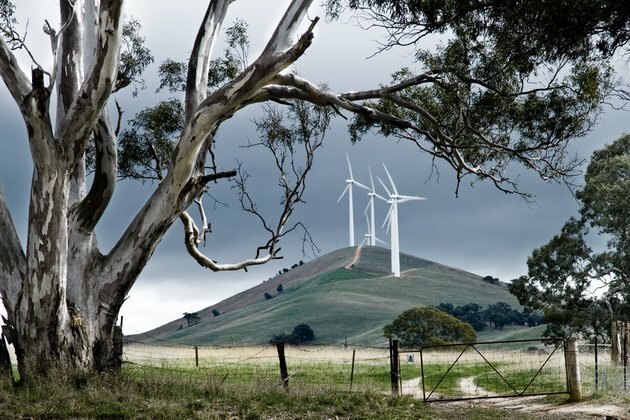The UK has a national climate change act ?why don't we?
The Conversation
16 May 2019, 07:51 GMT+10

No matter who wins the upcoming federal election, both the ALP and LNP are committed to remaining in the Paris Climate Agreement.
This means every five years Australia is expected to submit progressively stronger targets to reduce greenhouse gas emissions, and report on progress. And by 2020, Australia is expected to submit a long-term emissions reduction strategy showing how to get to net zero emissions.
Regardless of what policy mix is chosen to achieve this, the process of hitting the Paris targets is now a permanent feature of economy-wide decision-making, one that will need credible ongoing support from government and businesses. Policy uncertainty, and a lack of national framework, has reduced investment confidence.
The UK has shown how national climate change legislation can guide institutional action, and not only dramatically cut emissions, but also promote economic growth.
Victoria rolled out similar legislation in 2017, one of the first pieces of legislation in the world to be modelled on the Paris Agreement.
But Australia lacks a national version of Victoria's or UK's legislation.
We have national targets, but not yet ongoing systems embedded in departments. These systems would include measures to ensure continuous target-setting every five years (as used in other jurisdictions) with guidelines and progress reporting obligations. A lack of national legislation means the community and businesses lack transparency about Australia's long-term direction, pace and progress.
How national climate change legislation would work
A national Climate Change Act would reduce recognise climate change was not taken into account when many current laws were developed, and reduce policy instability around Australian meeting our Paris obligations by:
providing a role for governments and courts to flesh out and stabilise the low carbon transition
guiding an emissions reductions path that looks ten years ahead, across all sectors of the economy, and that can be ratcheted up if policies fail to meet their targets
ensuring transparent reporting of emissions and progress towards meeting interim Paris Agreement targets
allocating responsibilities across government for reporting and climate-conscious planning
signalling to business, communities and government agencies about emerging opportunities in a low carbon economy.
How Victoria did it
In 2017, the Victorian Labor government rolled out state-wide climate legislation, the Victorian Climate Change Act.
This legislation recognises how addressing climate change needs a whole-of-government approach, extending obligations to each state government portfolio.
And it has already catalysed climate change reporting and planning activity across government. An independent committee has been tasked with advising on the first ten years of emissions budgets.
Government departments are preparing adaptation plans for each sector, reviewing operational guidelines and establishing regular reporting of emissions in sectors and their future plans.
The UK's success story
The UK passed its Climate Change Act in 2008 with a near unanimous vote. It has guided government decisions on national energy and industrial policy ever since.
The Act contains a process for setting economy-wide, multi-year targets, generating a clear, but flexible path towards its long-term objective - an 80% reduction in national greenhouse gas emissions by 2050. It's not explicit about how targets are to be met and successive governments have been free to choose their own mitigation policies.
What has resulted is a clear shift away from the politics of the past where climate change action was traded off against other government goals.
Ever since the Act passed, subsequent UK parliaments have created management and efficiency initiatives, a minimum price on carbon (called carbon price floors), renewable energy targets, competitive reverse auction schemes and capacity markets.
Combined, these policies promote a competitive, sustainable, low carbon energy supply, along with economic growth and increased national energy security.
And the results have been extraordinary: emissions in the UK have fallen dramatically since 2008, with the UK's carbon dioxide emissions now below 1860s levels.
National transparency would improve the market
With a clear legislative process with interim targets every five years, a Climate Change Act for Australia would provide businesses and the public with a certainty around the pace of climate change action that reaches beyond the political cycles.
Governments would still have the freedom to choose interim targets and how to deliver them, but the legislation would create transparency around our obligations.
It would also ensure that a transition to a low-carbon future does not risk financial stability.
Regulatory bodies, such as the Australian Prudential Regulation Authority, the Bank of England, and the Financial Stability Board, recognise the necessity for climate change legislation to create confidence in markets. They are already applying pressure to local and international financial markets to improve disclosure of climate risk.
Finally, national legislation would ensure the market and the public are kept up-to-date about progress and future pathways, and how they can be involved in the process along the way. This includes investing in Australia's potential as a new lower-carbon powerhouse.
Let's agree what is agreed, and move on
Australian politicians don't often agree on climate change action, but the major parties do agree on Australia staying in the Paris Agreement.
A national Climate Change Act for Australia would embody this commitment, aligning us with the international process in a policy-flexible framework. Agreement on such an Act would show the Australian public that each party is serious about tackling climate change, providing a stable platform for the next parliament.
 Share
Share
 Tweet
Tweet
 Share
Share
 Flip
Flip
 Email
Email
Watch latest videos
Subscribe and Follow
Get a daily dose of Greek Herald news through our daily email, its complimentary and keeps you fully up to date with world and business news as well.
News RELEASES
Publish news of your business, community or sports group, personnel appointments, major event and more by submitting a news release to Greek Herald.
More InformationInternational Business
SectionShell rejects claim of early merger talks with BP
LONDON, U.K.: British oil giant Shell has denied reports that it is in talks to acquire rival oil company BP. The Wall Street Journal...
Trump-backed crypto project gets $100 million boost from UAE fund
LONDON, U.K.: A little-known investment fund based in the United Arab Emirates has emerged as the most prominent public backer of U.S....
RBI appoints Kesavan Ramachandran as new Executive Director
New Delhi [India], July 2 (ANI): The Reserve Bank of India (RBI) has appointed Kesavan Ramachandran as Executive Director of RBI with...
Eurozone inflation rate reaches 2 pct in June
The inflation is driven by the price of services, which recorded a yearly inflation rate of 3.3 percent in June, up from 3.2 percent...
Emirates layers on retrofitted aircraft with latest product, including Premium Economy to more cities
DUBAI, 1st July 2025 (WAM) -- Emirates will be layering on more retrofitted Boeing 777s and Airbus A380s on its existing schedules...
TVS Motors sold record 12.77 lakh units in April-June FY26; EV sales decline amid magnets shortage
Bengaluru (Karnataka) [India], July 1 (ANI): TVS Motor Company has recorded its highest-ever quarterly sales in the first quarter of...
Mediterranean
SectionApple allows outside payment links under EU pressure
SAN FRANCISCO, California: Under pressure from European regulators, Apple has revamped its App Store policies in the EU, introducing...
Israel agreed to finalise 60-day ceasefire in Gaza, says Donald Trump
Washington DC [US], July 2 (ANI): United States President Donald Trump on Tuesday (local time) said that Israel has agreed to the necessary...
Daily World Briefing, July 2
U.S. Senate passes Trump's landmark mega-bill The GOP-led Senate on Tuesday passed U.S. President Donald Trump's One Big Beautiful...
U.S.-WASHINGTON, D.C.-WHITE HOUSE-TRUMP-GAZA-CEASEFIRE
(250701) -- WASHINGTON, July 1, 2025 (Xinhua) -- U.S. President Donald Trump speaks to the press at the White House in Washington,...
Gaza war must continue Israeli minister
Finance Minister Bezalel Smotrich has said he will oppose any agreements to end the fighting Israeli Finance Minister Bezalel Smotrich...
Syrians in Trkiye look homeward as tensions ease
by Burak Akinci ANKARA, July 1 (Xinhua) -- Yousouf Al Sharif, a 35-year-old furniture worker from Syria living in Ankara, is thinking...














